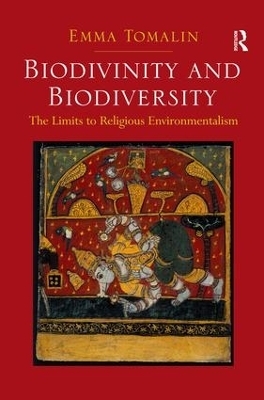
Biodivinity and Biodiversity
The Limits to Religious Environmentalism
Seiten
2009
Routledge (Verlag)
978-0-7546-5588-6 (ISBN)
Routledge (Verlag)
978-0-7546-5588-6 (ISBN)
Does linking of religion and environmental concerns as a strategy more suited to contexts where people have a level of material security that enables them to think and act like environmentalists? This book approaches this question through a series of case studies from Britain and India.
This book is concerned with the argument that religious traditions are inherently environmentally friendly. Yet in a developing country such as India, the majority of people cannot afford to put the 'Earth first' regardless of the extent to which this idea can be supported by their religious traditions. Does this mean that the linking of religion and environmental concerns is a strategy more suited to contexts where people have a level of material security that enables them to think and act like environmentalists? This question is approached through a series of case studies from Britain and India. The book concludes that there is a tension between the 'romantic' ecological discourse common among many western activists and scholars, and a more pragmatic approach, which is often found in India. The adoption of environmental causes by the Hindu Right in India makes it difficult to distinguish genuine concern for the environment from the broader politics surrounding the idea of a Hindu rashtra (nation). This raises a further level of analysis, which has not been provided in other studies.
This book is concerned with the argument that religious traditions are inherently environmentally friendly. Yet in a developing country such as India, the majority of people cannot afford to put the 'Earth first' regardless of the extent to which this idea can be supported by their religious traditions. Does this mean that the linking of religion and environmental concerns is a strategy more suited to contexts where people have a level of material security that enables them to think and act like environmentalists? This question is approached through a series of case studies from Britain and India. The book concludes that there is a tension between the 'romantic' ecological discourse common among many western activists and scholars, and a more pragmatic approach, which is often found in India. The adoption of environmental causes by the Hindu Right in India makes it difficult to distinguish genuine concern for the environment from the broader politics surrounding the idea of a Hindu rashtra (nation). This raises a further level of analysis, which has not been provided in other studies.
Dr Emma Tomalin is a Senior Lecturer in the Department of Theology and Religious Studies, University of Leeds, UK.
Chapter 1 Introduction; Chapter 2 The Religious Environmentalist Mode of Religion; Chapter 3 The Prehistory of Contemporary Environmentalism; Chapter 4 Environmentalisms: A Comparative Approach; Chapter 5 Religious Environmentalism and Environmental Direct Action in Britain; Chapter 6 Hinduism and the Environment: Radical to World Religions Approach; Chapter 7 Religious Environmentalism in India; Chapter 8 Conclusion;
| Erscheint lt. Verlag | 25.6.2009 |
|---|---|
| Verlagsort | London |
| Sprache | englisch |
| Maße | 156 x 234 mm |
| Gewicht | 453 g |
| Themenwelt | Geisteswissenschaften ► Geschichte ► Regional- / Ländergeschichte |
| Geisteswissenschaften ► Religion / Theologie ► Hinduismus | |
| Geisteswissenschaften ► Religion / Theologie ► Weitere Religionen | |
| Naturwissenschaften ► Geowissenschaften ► Geografie / Kartografie | |
| Sozialwissenschaften ► Soziologie ► Spezielle Soziologien | |
| Technik ► Umwelttechnik / Biotechnologie | |
| ISBN-10 | 0-7546-5588-1 / 0754655881 |
| ISBN-13 | 978-0-7546-5588-6 / 9780754655886 |
| Zustand | Neuware |
| Informationen gemäß Produktsicherheitsverordnung (GPSR) | |
| Haben Sie eine Frage zum Produkt? |
Mehr entdecken
aus dem Bereich
aus dem Bereich
Erinnerungen
Buch | Softcover (2024)
Pantheon (Verlag)
CHF 22,40


